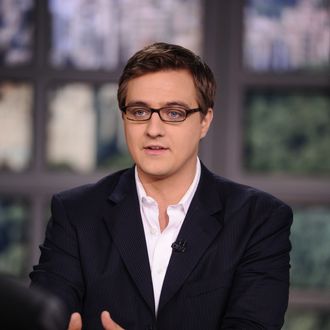
It’s a busy time for pundits — especially for MSNBC’s wonky and voluble evening host, Chris Hayes. He’s working on the final chapter of a second book, we’ve learned. Colony in a Nation, out next March, will document the historical development of two Americas — one of them the kind of democracy we read about in civics class and the other, per Hayes, an archipelago of aggressively over-surveilled police states. His first book, 2012’s Twilight of the Elites: America After Meritocracy, chronicled the erosion of our trust in elite institutions to rule wisely and welcome newcomers. In some ways it was too prescient: Imagine what an updated edition would make of this year’s Bern-it-all-down campaigns. He called in this week from Orlando, where he was covering the recent atrocity, to talk about his book, Trump, Sanders, and his own schemes and ambitions.
Do you feel the Florida shooting makes a Trump presidency more likely?
We’ve got a lot of evidence accrued on what fear does to people and it makes them more reactionary. The new book actually talks about crime and terrorism and how they do similar things to the body politic.
What made you embark on a book about criminal justice?
We covered it a lot before Ferguson and after Ferguson. The two main things it grew out of were all of that reporting and also my first-person experience of growing up in New York in the years when we had 2,500 murders as opposed to 350. What I’m trying to write about is, why did we — meaning us as citizens and particularly us as white people — build this system that we have?
So it’s not just about cops shooting innocent people.
No, it’s the entirety of the American carceral state, from the highest per capita prison rate in the world to the thousands of summonses that are issued for selling M&Ms. The argument is that we’ve made two republics that have functionally different expectations of them, different levels of rights. Sometimes it doesn’t feel like it was a democratic choice, but I kind of think it was.
Speaking again of democratic choices, you were writing this book about white fear during Trump’s improbable rise. Do you work him in?
I’m still figuring it out. White fear is always seeking its object. For a very long time, crime was the dominant political issue of the day. Then it was terrorism, now it’s a combination of immigration and terrorism, and politicians will come along and exploit it, cultivate it.
Why do you call the over-policed parts of the nation a colony?
In a colony, the force of law is in some fundamental sense not representative. There’s a chapter arguing that the complaints of the citizens were extremely close to the complaints of the founders. The precipitating spark of the revolution had a lot to do with policing powers, particularly the policing powers of the tax collectors. Taxes at that point were collected by what are essentially cops, because there was no one filing their 1090s. There is essentially the British version of stop-and-frisk, the arbitrary, capricious exercise of that power on colonial smugglers.
Are you trying to reclaim Founding Father rhetoric from the tea party?
Yes. There’s obviously the deeply complicating factor of race, but if you go back and read the DOJ report on Ferguson, the picture of state power that it conjures would be in some ways recognizable to the founders and odious to them.
Twilight of the Elites seems to have predicted this election.
I think it holds up pretty well. It’s about our myths of meritocracy and how removed they are from reality. And we have a guy who’s basically in some sense a ne’er-do well-real-estate heir running as the great hero of the working man.
And he channels the working man’s distrust. Isn’t Sanders, too?
Bill de Blasio said something interesting to me about this when I asked about his own kids — I think Chirlane had intimated that they were feeling the Bern. And his point was, in the same way that an entire generation of people was formed by the experience of the Great Depression and then WWII, this entire cohort have had their views on political economy formed by the financial crisis, and they have very left views, and they are come to honestly. They saw one of the most colossal failures of global financial capitalism and also elite leadership in decades.
So what happens now?
That’s a really good question. The last chapter of the new book is about what a justice system would look like if we were serious about valuing people’s lives equally. There is a place where elites choose their own justice system, and it’s on college campuses, particularly elite schools. And the system they choose basically tries to keep the criminal-justice system at bay at all costs, and it cherishes each life of possible offenders, because it values them.
There have been a lot staff changes at MSNBC. Is this part of a long-term plan B?
I love my job, I feel very privileged and it’s very important work to me, and also there’s a lot of things I want to do over the course of my career — a lot of things. I always have a number of different schemes and ambitions for the future. I think it’s a very exciting time in a lot of ways.






























